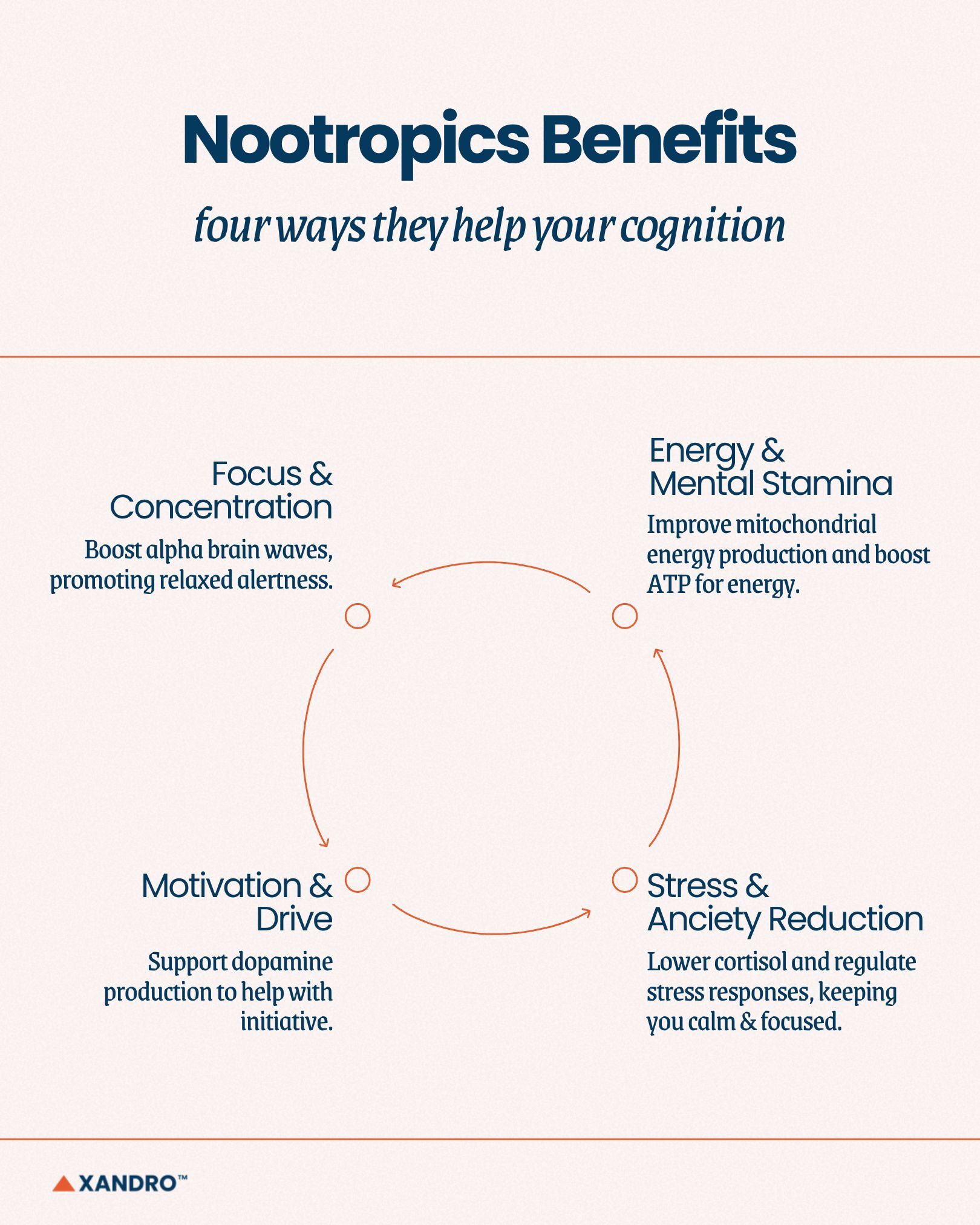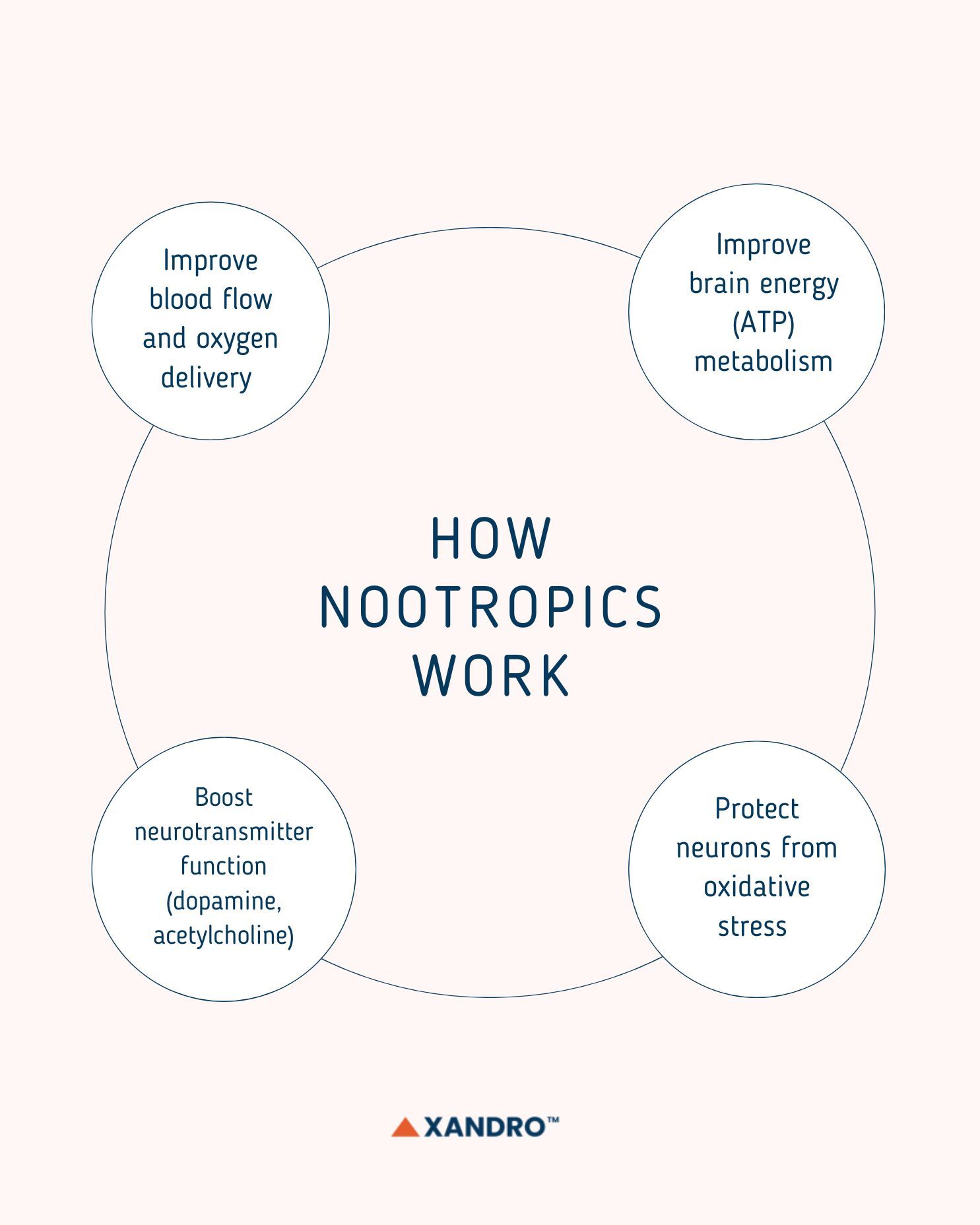Are There Nootropics That Actually Work?
17th Jun 2025
How Nootropics Like Protocol X Improve Productivity
We've all been there: staring at a blank screen, willing ourselves to start working, only to succumb to distractions, fatigue, or sheer lack of motivation.
Whether you're battling demotivated mornings, afternoon slumps, or chronic procrastination, the right nootropics for productivity could be the missing key to unlocking sustained productivity.
But do nootropics actually work? And if so, how do they improve focus, memory and motivation without the crashes and side effects of stimulants like Adderall or Modafinil?
We’ll explore how nootropics like Protocol X boost brain function, the science behind their mechanisms and which compounds truly deliver on their cognitive-enhancing promises.
Further Reading: What is Protocol X?
Nootropics Definition: What Are Nootropics and How Nootropics Work?
The term ‘nootropic’ comes from the Greek words nous (mind) and tropos (to bend or guide). Coined in the 1970s by psychologist Corneliu Giurgea, nootropics were originally defined as substances that improve memory, learning and mental resilience without harmful side effects.
Unlike stimulants that force neurotransmitter release (leading to crashes and dependency), nootropics work by:
- Improving brain energy metabolism (mitochondrial ATP production)
- Boosting neurotransmitter function (dopamine for motivation, acetylcholine for memory)
- Protecting neurons from oxidative stress (reducing mental fatigue)
- Improving blood flow and oxygen delivery (sharpening focus)
This makes them a sustainable alternative for those looking for long-term cognitive improvement rather than a short-lived buzz.
But are there any nootropics that actually work? The answer depends on the type and how they’re used. Some, like caffeine, provide a short-term boost, while others (such as adaptogenic herbs and cholinergic compounds) work gradually to boost brain function over time.
Further Reading: Everything You Need To Know About Nootropics
The Cognitive Pathways to Productivity and How Nootropics Help
True productivity isn’t just about working harder; it’s about working smarter. That means improving:
1. Focus and Concentration
Focus is clarity of thought, like a sharp camera lens. Concentration is the ability to stay on task despite distractions. Without both, productivity crumbles.
Nootropics like L-Theanine (paired with caffeine) and Bacopa Monnieri boost alpha brain waves, promoting relaxed alertness. Meanwhile, choline donors (like Phosphatidylcholine in Protocol X) support acetylcholine, the neurotransmitter crucial for memory and attention.
For those with ADHD-like symptoms, Citicoline (CDP-Choline) and Rhodiola Rosea may improve sustained attention without jitters.
Further Reading: What are the Ingredients in Protocol X?
2. Energy and Mental Stamina
The brain consumes 20 per cent of the body’s energy, yet most ‘energy boosters’ (like caffeine) provide fleeting stimulation followed by crashes.
Nootropics like Acetyl-L-Carnitine (ALCAR) and Panax Ginseng improve mitochondrial energy production, while Cordyceps Mushroom boosts ATP, which is the body’s cellular fuel. The result? Steady, crash-free mental energy.
3. Motivation and Drive
What effect do nootropics have on motivation? Low dopamine leads to procrastination and a lack of initiative. Instead of relying on harsh stimulants, nootropics for productivity like Mucuna Pruriens (L-Dopa precursor) and Tyrosine naturally support dopamine synthesis, helping you start tasks with less resistance.
4. Stress and Anxiety Reduction
Chronic stress damages cognition by flooding the brain with cortisol. Adaptogens like Ashwagandha lower cortisol, while Phosphatidylserine (PS) regulates stress responses, keeping you calm yet focused.

Is There Any Evidence that Nootropics Work?
While research is still evolving, several nootropics have strong scientific backing:
- Bacopa Monnieri → Improves memory and learning.
- L-Theanine + Caffeine → Enhances focus without jitters.
- Rhodiola Rosea → One of the natural nootropics that reduces mental fatigue.
- Phosphatidylserine (PS) → Supports memory in ageing adults.
That said, not all nootropics are equally effective. Synthetic stimulants may offer short-term boosts but harm long-term cognitive health. Natural nootropics, on the other hand, provide sustainable improvement by working with the brain’s biology.
Protocol X and the Role of Cholinergics in Cognitive Performance
While many great ingredients in Protocol X boost brain health, one key ingredient — Phosphatidylcholine (Lecithin) — plays an important role in brain function. As a precursor to acetylcholine, it supports:
- Memory formation
- Focus and attention
- Neuroplasticity (brain adaptability)
While studies on Lecithin’s effects are mixed, research suggests it benefits those with low choline levels, which is common in ageing brains or high-demand cognitive work. For students and knowledge workers, this makes it a valuable addition to a nootropic stack.
Further Reading: How to Stack Protocol X with Other Supplements?
Natural vs. Synthetic Nootropics: Which Is Better?
Many turn to nootropics as safer alternatives to Adderall or Modafinil. While prescription stimulants force neurotransmitter release (leading to dependency), natural nootropics support the brain’s own mechanisms for sustainable results.
Best Natural Nootropics for Productivity:
- Lion’s Mane Mushroom: May stimulate nerve growth factor (NGF) for long-term brain health.
- Bacopa Monnieri: Boosts memory and learning over time.
- Rhodiola Rosea: Reduces fatigue and improves stress resilience.
- Phosphatidylcholine (Lecithin): Supports acetylcholine production.
Synthetics like Noopept or Modafinil may offer sharper short-term effects but come with risks like tolerance buildup and withdrawal.
End Note: Building a Smarter, More Productive Brain
Nootropics aren’t magic pills. They work best alongside good sleep, nutrition and habits, but when used correctly, they can help:
- Break through mental fog
- Sustain energy without crashes
- Boost memory and learning
- Reduce procrastination and stress
For those looking for alternatives to stimulants, natural nootropics like Protocol X offer a balanced, science-backed approach to cognitive enhancement.
Disclaimer: This article is for informational purposes only and not medical advice. Speak with your doctor before starting any new supplement.

